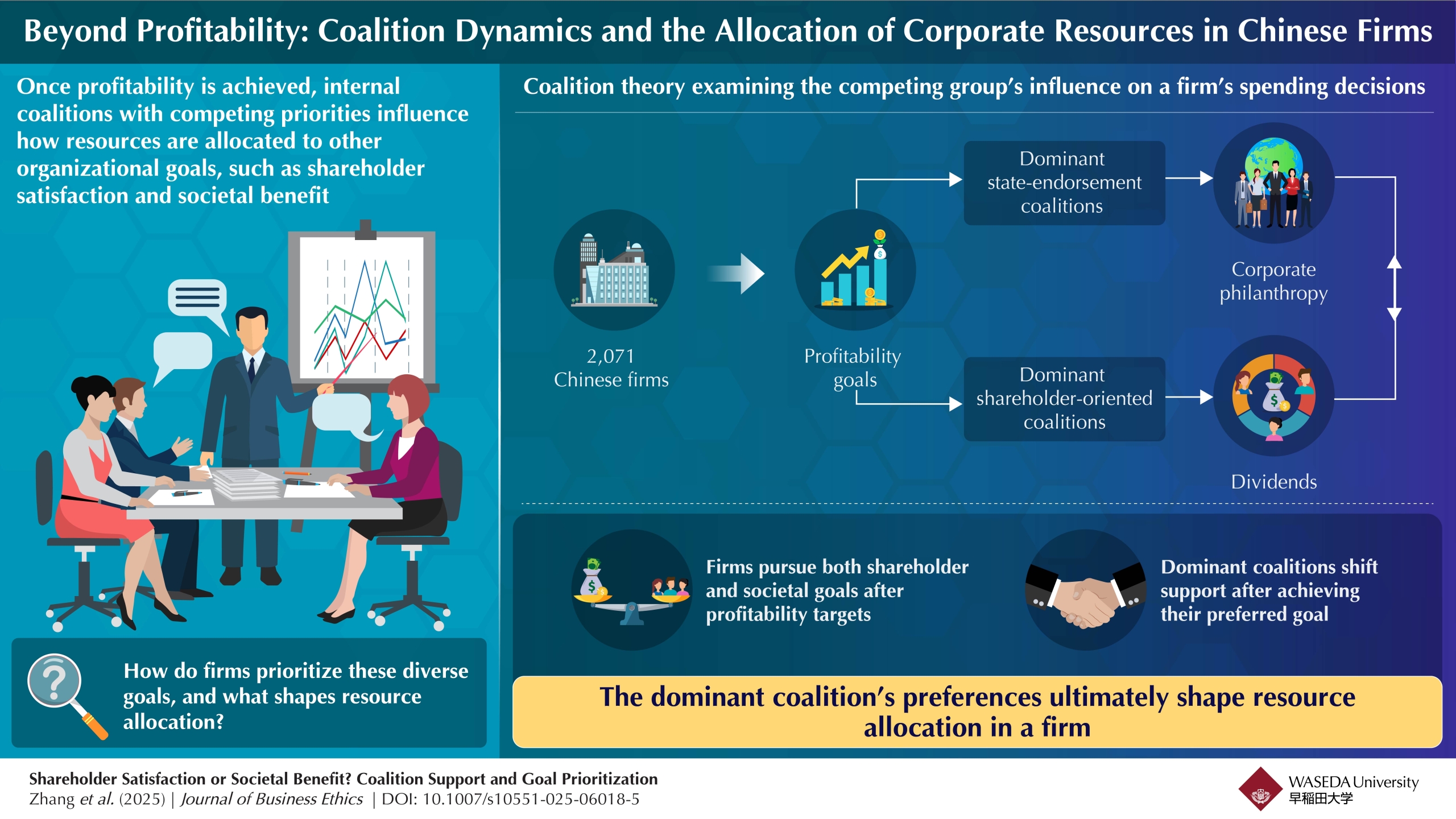Boardroom Battles: How Corporate Coalitions Influence Firms’ Resource Allocation
Fri, May 30, 2025-
Tags
Boardroom Battles: How Corporate Coalitions Influence Firms’ Resource Allocation
Study finds competing coalitions within corporate boards influence a firm’s spending decisions after profitability goals are met
A new study shows how internal coalitions shape corporate decisions after profitability goals are met. Analyzing Chinese firms, researchers found that shareholder-value coalitions tend to increase dividend payments, while state-endorsed coalitions prioritize corporate philanthropy. These competing goals highlight how internal power dynamics influence how firms allocate surplus resources. The findings offer important insights for investors, executives, and policymakers seeking to understand how companies manage competing objectives such as shareholder satisfaction and social priorities.

Based on data from over 2,000 Chinese firms (2008–2013), this study finds that once profitability targets are met, firms allocate resources according to the influence of dominant board coalitions. Board members with finance backgrounds tend to favor shareholder payouts, while those with government ties promote social welfare initiatives
Once organizations achieve their profitability and market performance targets, they often focus on additional goals. However, these goals do not always align and can sometimes conflict. For example, prioritizing shareholder returns may come at the expense of investments in social causes. This raises a critical question: How do companies decide where to allocate their surplus resources and which goals to prioritize?
A study published online in the Journal of Business Ethics on May 9, 2025, examines this question by turning the spotlight on the boardroom. A research team consisting of Professor Toru Yoshikawa from the School of Social Sciences, Waseda University, Japan, along with Associate Professor Cyndi Man Zhang of Singapore Management University and Professor Helen Wei Hu of the University of Melbourne, explores how internal politics, specifically the power struggles between different groups within corporate boards, influence how firms allocate resources between shareholder payouts and societal contributions.
“We were intrigued by the idea that while for-profit organizations need to prioritize financial goals to survive, they may still have some discretion in how they use their resources afterwards. Boardrooms can be political arenas, with subgroups competing for influence. We wanted to understand how these dynamics shape resource allocation,” explains Yoshikawa.
To understand how corporate boards manage competing priorities, the study develops a theory identifying two dominant board coalitions. The shareholder-value coalition, typically composed of CEOs and directors with expertise in finance or accounting, prioritizes maximizing shareholder value through dividend payments. In contrast, the state-endorsement coalition, consisting of board members with prior experience in government roles, emphasizes corporate donations and initiatives aligned with corporate social responsibility.
To test this theory, the researchers analyzed data from 2,071 Chinese firms listed on the Shanghai and Shenzhen Stock Exchanges between 2008 and 2013, which accounted for more than 84% of China’s GDP at the time. They examined each company’s financial performance, dividend payments, philanthropic donations, and the professional backgrounds of board members to classify firms based on which coalition held more influence.
Given China’s unique governance system, which blends market-driven capitalism with strong state involvement, these firms presented a distinctive boardroom structure. Many featured both a shareholder-value coalition, focused on maximizing shareholder returns through dividends, and a state-endorsement coalition, which tended to support goals aligned with public welfare and social harmony.
The study focused on two main outcomes: dividend payments to shareholders and corporate donations to social causes. The researchers examined how resources were allocated after confirming that each firm had met its financial targets. They found that once firms reached their profitability goals, they often pursued both shareholder satisfaction and societal benefit. But the amount of attention and resources each goal received depended on which coalition held more power within the board.

The study identifies two dominant board coalitions: a shareholder-value coalition of former accounting experts focused on maximizing returns through dividends and a state-endorsement coalition of formaer government officials prioritizing social responsibility initiatives.
Firms with stronger state-endorsement coalitions spent more on corporate donations, but this increase in social contributions did not come at the expense of shareholder dividends. In contrast, firms with stronger shareholder-value coalitions were more likely to increase dividend payments. Interestingly, once a coalition achieved its primary goal, it often became more supportive of the other goal.
These findings offer a rare glimpse into boardroom politics, providing valuable clues about how firms prioritize and distribute their resources. Understanding these dynamics is crucial for anticipating how companies navigate competing priorities and allocate their resources.
“Shareholders should pay attention to their invested firm’s board composition because there might be subgroups within the board, and each subgroup may push for different goals that may not always be aligned with shareholders’ interests,” says Yoshikawa.
Reference
Title of original paper: Shareholder Satisfaction or Societal Benefit? Coalition Support and Goal Prioritization
DOI: 10.1007/s10551-025-06018-5
Journal: Journal of Business Ethics
Article Publication Date: 09 May 2025
Authors: Cyndi Man Zhang1, Helen Wei Hu2, and Toru Yoshikawa3
Affiliation:
1. Lee Kong Chian School of Business, Singapore Management University, Singapore
2. Faculty of Business and Economics, University of Melbourne, Australia
3. School of Social Sciences, Waseda University, Japan














